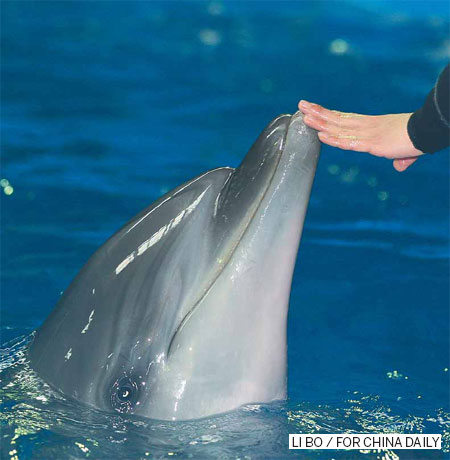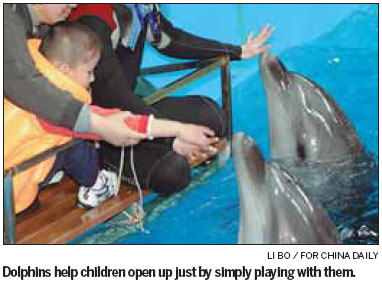 ?
?

Dolphin-assisted therapy for children with mental disabilities has made a splash in the West, and China is now riding the experimental tide. Shi Yingying and Erik Nilsson examine the impact these marine mammals have on the children they come into contact with.
Zheng Jun says 15 sessions with a pair of bottle-nosed dolphins at Hangzhou Polar Ocean Park have helped his 5-year-old autistic son become "aware" and "alert" enough to become his kindergarten's class monitor. The father believes the dolphin-assisted therapy has been more effective than any other treatment. "Now, you can't tell he's different from his classmates," he says. Zheng became a believer after he visited an Australian dolphin-swim program years ago. He says his son is elated when he splashes with the creatures in the park in Zhejiang province's capital.
More than 80 parents of children with severe mental disabilities have booked all of next year's spots in the program. (Sessions only run in the summer because the water temperatures are too cold for the kids in other seasons.)
So, newcomers must wait until 2014, says Liu Quansheng, manager of the park's owner, Zhejiang Aquarium Investment Group.
Despite the demand, dolphin-assisted therapy has not been scientifically proven. Still, many experts and parents of special-needs children swear by it.
Liu, who also coordinates his company's 3-year-old dolphin-swim program, says: "People with mental disabilities often have short attention spans. Swimming with dolphins helps them relax and focus."
This is especially true of children, he says.
"Dolphin therapy is effective because these animals hold the kids' attention better than even the most engaging human therapist," he says.
While the science of dolphin-assisted therapy's assortment of purported benefits hasn't been verified, many believe at least some benefits come from the experience's emotional magic.
"Once the children are in the pool they're only focused on the dolphins. They love it, because the creatures let the kids touch and kiss them, grab their fins and swim with them."
Most proponents agree on the merit of the fun factor. Some also claim it boosts people's immune systems.
And many experts contend the therapy's benefits run deeper.
Dolphins' presence palpably changes water. Those who swim with the creatures report fizzing sounds, as if the marine mammals carbonate the water. The sound has been compared to popcorn, flames and sparklers.
The marine animals' ultrasonic energy is four times more powerful than scientific instruments used to peer inside the body to make diagnoses, monitor pregnancies and break down kidney stones, gallstones and cataract-clouded lenses.
This is amplified by the water, which transmits sounds at 60 times air's efficiency. The ultrasonic energy then enters our bodies - which are, in turn, mostly water. But how - and if - this helps children with mental disabilities remains unclear.
Preliminary tests by the AquaThought Foundation suggest human brainwaves change when they interact with dolphins. One theory says the two species' frequencies sync during interactions.
AquaThought researchers report shifts in neural oscillations among people who interact with the marine mammals. Their studies have measured switches from the beta state of everyday consciousness, to the alpha state that is typical of relaxed closed-eyed wakefulness. Subjects sometimes also slip into the meditative theta state, the results find.
The foundation also measured increased synchronization between the brain's hemispheres, which is linked to enhanced learning and cognizance.
Western therapists have for decades used dolphins to treat children with autism, Down syndrome, cerebral palsy and other neurological disorders.
China has only recently started experimenting with dolphin-swims, among other forms of animal-assisted therapy.
But a lack of scientific affirmation of the treatments' effectiveness isn't the sole source of opposition.
Animal rights advocates oppose the practice.
Marketing director of Shanghai's Changfeng Park Ocean World Xu Jie says the aquarium nixed its dolphin-swim therapy program when British operator Merlin Entertainments invested in the park last year.
"They really value animal rights," Xu says. "They believed it was too much to have the dolphins work as both healers and performers."
That's why Hangzhou Polar Ocean Park has designated two of its 15 dolphins solely for therapy.
"It would be too much for them to both perform and provide therapy," Liu says."The dolphins might feel stress and could even hurt the children."
Each dolphin only sees two or three children a day.
The treatments cost 2,300 yuan ($370) for 15 sessions, given every other day over a month.
Zheng believes it's money well spent.
Whether dolphin-assisted therapy is science or pseudoscience - or something else entirely - the father says his son's progress is the only proof he needs that it works.
Contact the writers at shiyingying@chinadaily.com.cn and erik_nilsson@chinadaily.com.cn.
(China Daily 12/16/2012 page1)
